
Question Number 13733 by prakash jain last updated on 22/May/17
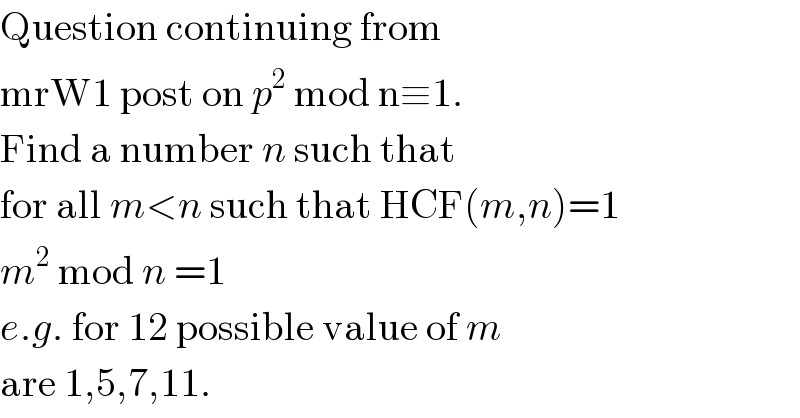
$$\mathrm{Question}\:\mathrm{continuing}\:\mathrm{from} \\ $$$$\mathrm{mrW1}\:\mathrm{post}\:\mathrm{on}\:{p}^{\mathrm{2}} \:\mathrm{mod}\:\mathrm{n}\equiv\mathrm{1}. \\ $$$$\mathrm{Find}\:\mathrm{a}\:\mathrm{number}\:{n}\:\mathrm{such}\:\mathrm{that} \\ $$$$\mathrm{for}\:\mathrm{all}\:{m}<{n}\:\mathrm{such}\:\mathrm{that}\:\mathrm{HCF}\left({m},{n}\right)=\mathrm{1} \\ $$$${m}^{\mathrm{2}} \:\mathrm{mod}\:{n}\:=\mathrm{1} \\ $$$${e}.{g}.\:\mathrm{for}\:\mathrm{12}\:\mathrm{possible}\:\mathrm{value}\:\mathrm{of}\:{m} \\ $$$$\mathrm{are}\:\mathrm{1},\mathrm{5},\mathrm{7},\mathrm{11}. \\ $$
Commented by prakash jain last updated on 22/May/17
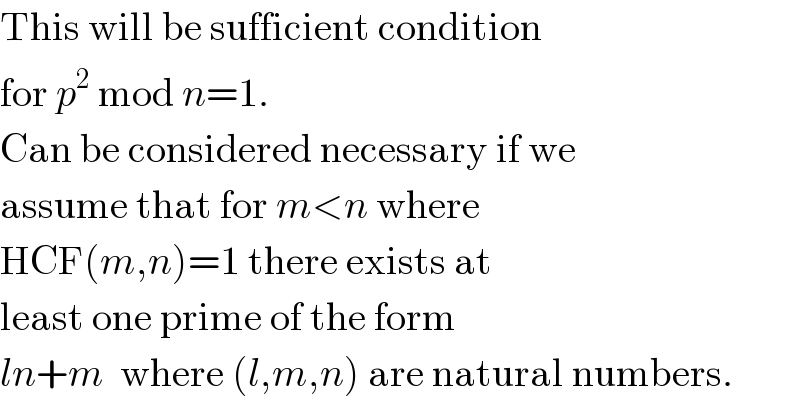
$$\mathrm{This}\:\mathrm{will}\:\mathrm{be}\:\mathrm{sufficient}\:\mathrm{condition} \\ $$$$\mathrm{for}\:{p}^{\mathrm{2}} \:\mathrm{mod}\:{n}=\mathrm{1}. \\ $$$$\mathrm{Can}\:\mathrm{be}\:\mathrm{considered}\:\mathrm{necessary}\:\mathrm{if}\:\mathrm{we} \\ $$$$\mathrm{assume}\:\mathrm{that}\:\mathrm{for}\:{m}<{n}\:\mathrm{where} \\ $$$$\mathrm{HCF}\left({m},{n}\right)=\mathrm{1}\:\mathrm{there}\:\mathrm{exists}\:\mathrm{at} \\ $$$$\mathrm{least}\:\mathrm{one}\:\mathrm{prime}\:\mathrm{of}\:\mathrm{the}\:\mathrm{form} \\ $$$${ln}+{m}\:\:\mathrm{where}\:\left({l},{m},{n}\right)\:\mathrm{are}\:\mathrm{natural}\:\mathrm{numbers}. \\ $$
Commented by mrW1 last updated on 23/May/17
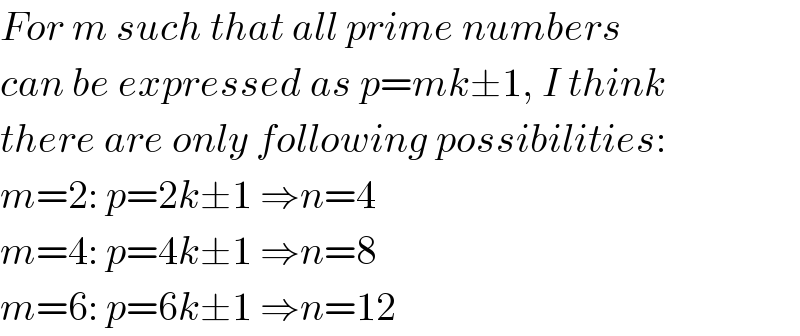
$${For}\:{m}\:{such}\:{that}\:{all}\:{prime}\:{numbers} \\ $$$${can}\:{be}\:{expressed}\:{as}\:{p}={mk}\pm\mathrm{1},\:{I}\:{think} \\ $$$${there}\:{are}\:{only}\:{following}\:{possibilities}: \\ $$$${m}=\mathrm{2}:\:{p}=\mathrm{2}{k}\pm\mathrm{1}\:\Rightarrow{n}=\mathrm{4} \\ $$$${m}=\mathrm{4}:\:{p}=\mathrm{4}{k}\pm\mathrm{1}\:\Rightarrow{n}=\mathrm{8} \\ $$$${m}=\mathrm{6}:\:{p}=\mathrm{6}{k}\pm\mathrm{1}\:\Rightarrow{n}=\mathrm{12} \\ $$
Commented by prakash jain last updated on 23/May/17
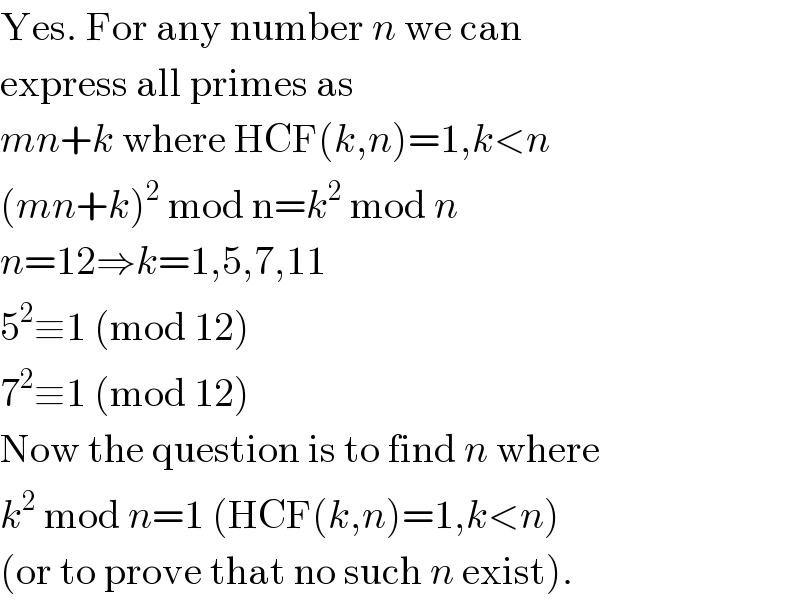
$$\mathrm{Yes}.\:\mathrm{For}\:\mathrm{any}\:\mathrm{number}\:{n}\:\mathrm{we}\:\mathrm{can}\: \\ $$$$\mathrm{express}\:\mathrm{all}\:\mathrm{primes}\:\mathrm{as} \\ $$$${mn}+{k}\:\mathrm{where}\:\mathrm{HCF}\left({k},{n}\right)=\mathrm{1},{k}<{n} \\ $$$$\left({mn}+{k}\right)^{\mathrm{2}} \:\mathrm{mod}\:\mathrm{n}={k}^{\mathrm{2}} \:\mathrm{mod}\:{n} \\ $$$${n}=\mathrm{12}\Rightarrow{k}=\mathrm{1},\mathrm{5},\mathrm{7},\mathrm{11} \\ $$$$\mathrm{5}^{\mathrm{2}} \equiv\mathrm{1}\:\left(\mathrm{mod}\:\mathrm{12}\right) \\ $$$$\mathrm{7}^{\mathrm{2}} \equiv\mathrm{1}\:\left(\mathrm{mod}\:\mathrm{12}\right)\: \\ $$$$\mathrm{Now}\:\mathrm{the}\:\mathrm{question}\:\mathrm{is}\:\mathrm{to}\:\mathrm{find}\:{n}\:\mathrm{where} \\ $$$${k}^{\mathrm{2}} \:\mathrm{mod}\:{n}=\mathrm{1}\:\left(\mathrm{HCF}\left({k},{n}\right)=\mathrm{1},{k}<{n}\right) \\ $$$$\left(\mathrm{or}\:\mathrm{to}\:\mathrm{prove}\:\mathrm{that}\:\mathrm{no}\:\mathrm{such}\:{n}\:\mathrm{exist}\right). \\ $$
Commented by prakash jain last updated on 23/May/17
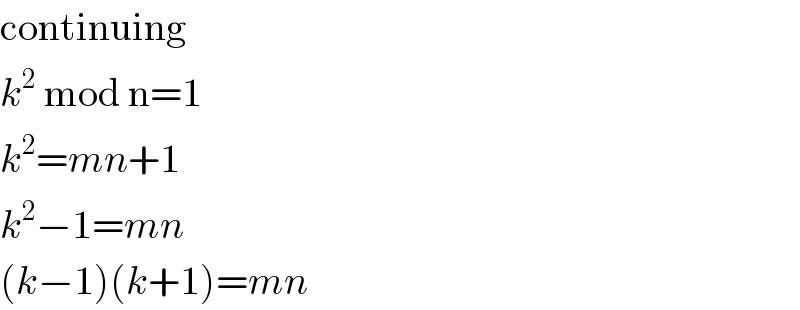
$$\mathrm{continuing} \\ $$$${k}^{\mathrm{2}} \:\mathrm{mod}\:\mathrm{n}=\mathrm{1} \\ $$$${k}^{\mathrm{2}} ={mn}+\mathrm{1} \\ $$$${k}^{\mathrm{2}} −\mathrm{1}={mn} \\ $$$$\left({k}−\mathrm{1}\right)\left({k}+\mathrm{1}\right)={mn} \\ $$
